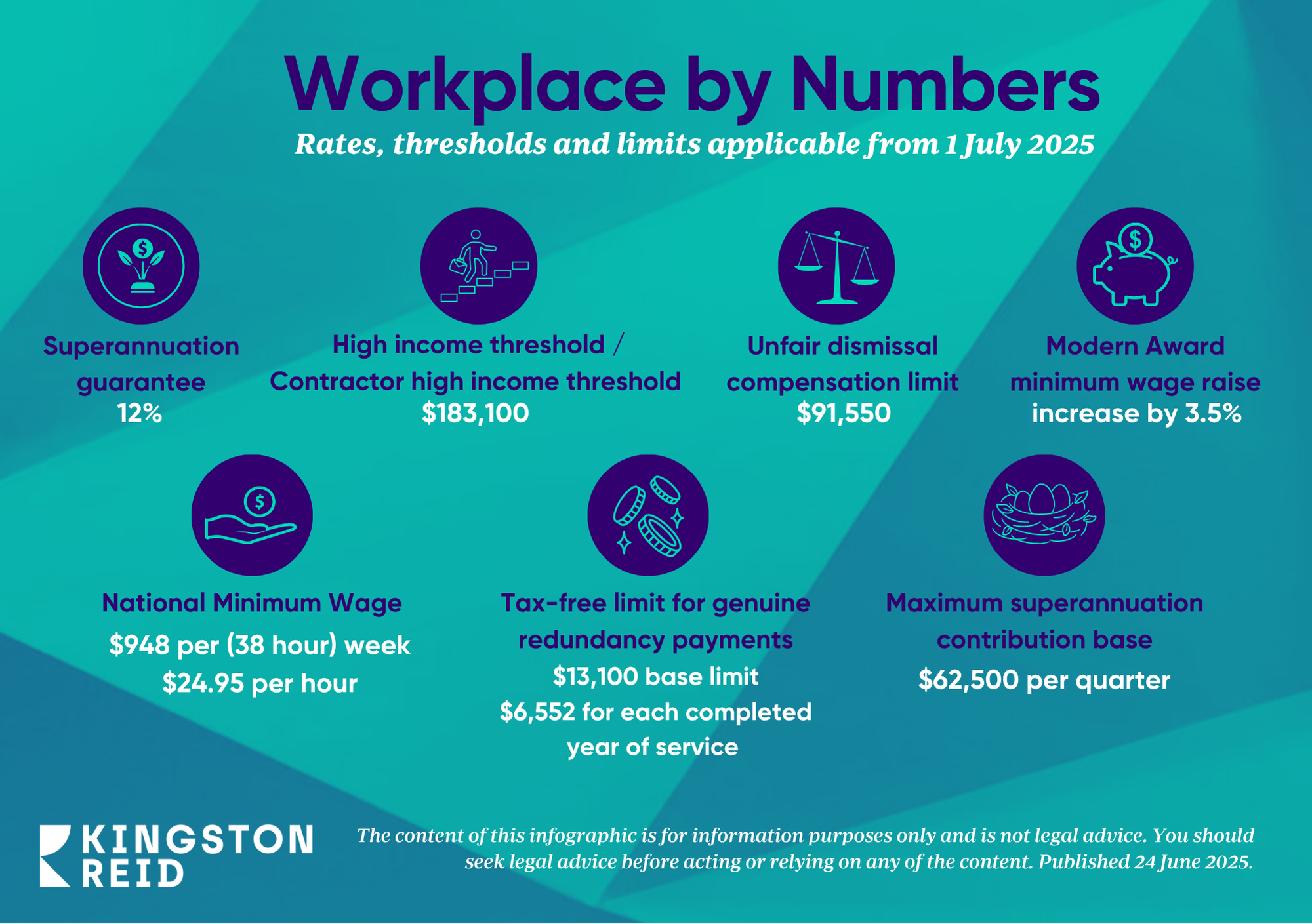August 19, 2025
The Australian Human Rights Commission (AHRC) is increasing its attention on employers’ efforts to prevent workplace sexual harassment, sex discrimination and victimisation. Focusing on high-risk industries like retail and hospitality, the AHRC is shifting from reactive complaints to a more proactive, systemic prevention strategy.
The AHRC’s continued emphasis reflects a broader cultural shift in Australian workplace norms. Employers across all sectors should take proactive steps to review their practices, engage with available resources and ensure they are not only meeting but exceeding their obligations under the Sex Discrimination Act 1984 (Cth) (the Act).
Understanding positive duty obligations
Introduced in 2022, s47C of the Act imposes a positive duty on employers and persons conducting a business or undertaking to take reasonable and proportionate measures to eliminate, as far as possible, sex discrimination, sexual harassment, sex-based harassment, hostile workplace environments on the grounds of sex and related acts of victimisation. This duty applies to all employers and extends to conduct by their employees, workers, agents, and, in some cases, third parties such as customers and clients.
The AHRC makes it clear that “reasonable and proportionate” steps will vary depending on the size, resources and risk profile of each business. Nonetheless, all businesses are expected to address seven core standards: leadership, culture, knowledge, risk management, support, reporting and response and monitoring and transparency. Unlike previous frameworks which largely relied on individual complaints, the positive duty compels employers to act proactively. Prevention is now the legal standard, not merely a best practice.
The AHRC’s compliance and enforcement strategies
Since December 2023, the AHRC has had the power to monitor and enforce compliance with the positive duty. In the 2024-25 financial year, the AHRC commenced formal inquiries into businesses in the Retail Trade, Accommodation & Food Services, Finance and Transport, Postal & Warehousing sectors, collectively covering approximately 7,500 workers. These inquiries were triggered by evidence of serious unlawful conduct, sourced from workers, regulators and media reports.
In June 2025, the AHRC released its Speaking from Experience report, drawing on the lived experiences of over 300 victim-survivors from diverse backgrounds. The findings expose persistent barriers to safety and justice, particularly for marginalised groups, and underscore the need for systemic reform.
The report sets out 11 recommendations which emphasise the need for cultural change, leadership commitment and transparent reporting, alongside calls for legislative reform to strengthen employer accountability. Notably, it recommends the introduction of civil penalties for breaches of the positive duty, enhanced information sharing between regulators, and restrictions on the use of non-disclosure agreements in workplace sexual harassment cases.
The Australian Law Reform Commission (ALRC) also recommended civil penalties for breach of the positive duty in its January 2025 Safe, Informed, Supported: Reforming Justice Responses to Sexual Violence report.
For 2025-26, the AHRC will continue to prioritise proactive compliance and enforcement in the Retail Trade and Accommodation & Food Services industries, which are identified as high-risk due to their large workforces and elevated exposure to sexual harassment.
The AHRC’s proactive compliance and enforcement strategies are scheduled to launch in September 2025. In the interim, as of July 2025, the AHRC has released several new resources and tools, including updated online learning modules and educational animations, tailored for broad dissemination across industry, government and community sectors. Further, they are working toward:
- creating a compliance survey for medium and large retailers, assessing adherence to the seven positive duty standards, with plans to extend this approach to the Accommodation & Food Services sector;
- creating an education package for senior leaders of large retail businesses, focusing on practical tools to facilitate compliance and address concerns about their responsibilities; and
- hosting the second National Regulator Roundtable in September 2025, which will bring together federal, state and territory regulators to coordinate efforts and measure regulatory effectiveness.
Legal and practical implications for businesses
Civil penalties for breaches of positive duty are now being considered as both the AHRC and ALRC recommend this reform. NSW has already amended its legislation for public sector employees. If implemented, employers risk significant financial and reputational consequences for non-compliance, alongside current enforcement measures like compliance notices and enforceable undertakings. To satisfy positive duty obligations, businesses must:
- Conduct risk assessments: identify and address specific risk factors in their workplace, including those arising from third-party interactions;
- Review and update policies: ensure policies on respectful behaviour, unlawful conduct, and reporting are current, accessible and consistently enforced;
- Implement training and awareness programs: provide regular, tailored education for all staff, including leaders and managers, with a focus on intersectionality and trauma-informed approaches;
- Establish robust reporting and support systems: offer multiple, accessible avenues for reporting, ensure timely and person-centred responses and provide appropriate support to those affected; and
- Monitor, evaluate and report: collect and analyse data on workplace culture, incidents and outcomes, and use this information to drive continuous improvement.
Broader significance and potential impact
The AHRC’s initiatives represent its ongoing commitment towards fostering safer, more respectful and inclusive workplaces across Australia. With positive duty compliance now established as the legal minimum, organisations are expected to demonstrate leadership, invest in cultural change and take meaningful, sustained action to prevent harm. This shift towards proactive, preventative regulation is intended to improve workplace safety, promote greater inclusion and reduce the prevalence of sexual harassment and discrimination. However, businesses must be prepared for increased scrutiny, higher compliance expectations and the possibility of civil penalties for serious or repeated breaches.
The views expressed in this article are general in nature only and do not constitute legal advice. Please contact us if you require specific advice tailored to the needs of your organisation’s circumstances.

